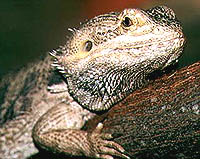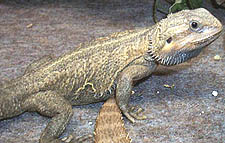Bearded Dragons
Native to Australia, the bearded dragon is quickly becoming one of the most popular exotic pets worldwide. This interesting animal gets its name from the ability to extend the skin under the neck in a beard-like fashion. The bearded dragon has become a favorite pet due to its tame personality and ease of handling.

Selecting your Bearded Dragon
A healthy animal has clear and bright eyes. When they are not basking in the warmth of the sun or sleeping, the bearded dragon keeps the front portion of its body slightly elevated. If the dragon simply lies about and does not seem active, this can indicate poor health. Hold the animal to get an idea of its weight and muscle tone. Healthy dragons have round bodies and tails. The limbs should be free from swellings and the skin should look healthy and free of parasites.
Environment
A bearded dragon's environment should range between 80-85 degrees F. You should also provide a small area at 95 degrees F. where the animal can bask. It's good to invest in a good thermometer in order to maintain these optimal temperatures.

Feeding
The standard diet for a bearded dragons is crickets, mealworms, and juvenile mice. Mealworms should comprise up to thirty percent of the total diet and crickets should be fed every two days. To insure proper nutrition, a vitamin supplement is included twice. The water bowl needs to be washed daily with soap and water and clean fresh water is given daily.
Health
Internal Parasites - Runny stools or sudden weight loss can indicate internal parasites (worms). Other diseases can mimic parasitic infections so it is best to consult your veterinarian if your dragon seems to have a problem.
External Parasites (Mites) - If detected, mites should be removed with tweezers and cleaned with alcohol. Make sure to not leave the head behind as they can cause skin infections.
Every day, observe your dragon for at least 15 minutes. If you notice the slightest change in behavior or eating habits take your pet to a veterinarian for an examination. If you do not have a veterinarian, it's best to look for one who has experience with reptiles.
[ Search Articles ] [ Article Index ]
